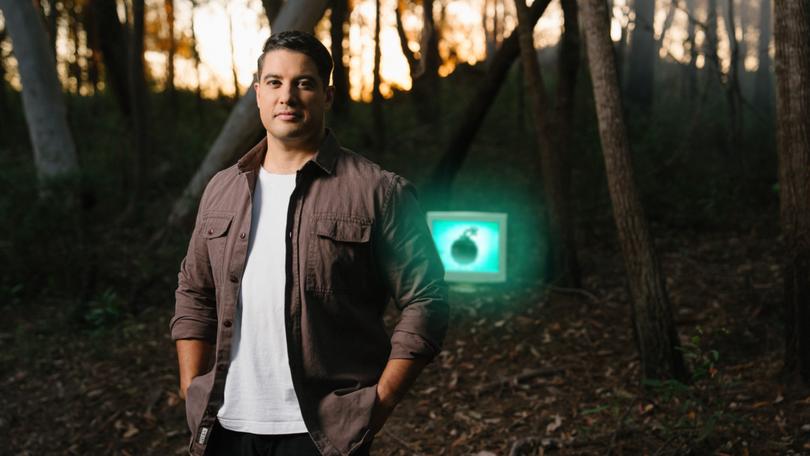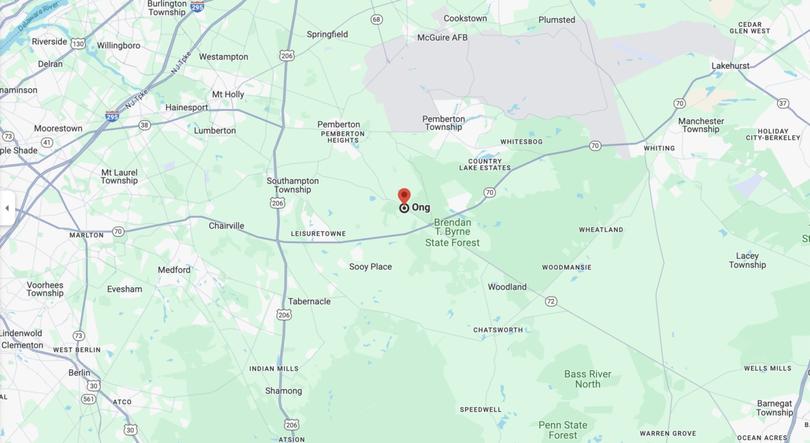This is Not a Game: The internet’s first conspiracy theory, Ong’s Hat, was a warning we didn’t hear
Have you ever heard of Ong’s Hat? It’s both a ghost town and the internet’s first conspiracy theory.

Marc Fennell was standing in the middle of the New Jersey Pine Barrens and he was cold and creeped out. “It definitely feels haunted as f**k”, he recalled.
The Pine Barrens is a stretch of land notorious as a dumping ground for mobsters and as the home of the mythical Jersey Devil, a creature that was said to have originated as the cursed 13th child of an 18th century local woman. Fittingly, the Pine Barrens has been featured on both The Sopranos and The X-Files.
Fennell doesn’t believe in supernatural beings but standing in the middle of the woods, a place with a spooky reputation, on a frosty November night every sceptical bone in his body was in retreat.
Sign up to The Nightly's newsletters.
Get the first look at the digital newspaper, curated daily stories and breaking headlines delivered to your inbox.
By continuing you agree to our Terms and Privacy Policy.“The trees are all really straight, and sound and air move interestingly, so when the wind moves, it bounces off the trees and you feel like someone’s breathing down your neck because the wind’s coming from here but you’re feeling it back there,” he told The Nightly.
He looked at his producer, Emma Weatherill, and said, “Gee, we find ourselves in some weird situations, don’t we?”
This is Not a Game is Fennell’s latest podcast series and it is, by his own admission, the strangest thing he’s done. The six-part series, available now on Audible, sees him tackle the internet’s first large-scale conspiracy theory, a little-known game-cum-hoax called Ong’s Hat.
It originated in the 1980s, the brainchild of Joseph Matheny and his collaborators, and it cast a real-life ghost town in the Pine Barrens called Ong’s Hat and spun a story that it was the site of a secret compound set up by Princeton physicists experimenting with inter-dimensional travel.
As it goes, these rogue scientists succeeded in their mission and had built a device called The Egg, which enabled people to cross over into parallel universes.
Eventually, the military threatened to undo everything and the inhabitants of Ong’s Hat moved to the alternate dimension, leaving behind only the gateway and some literature.

For early internet nerds, those primed to believe in fringe science theories, Ong’s Hat was a compelling proposition, and they were enthusiastic followers of the idea. They went down the rabbit hole Matheny and his cohort created and seeded.
“How much priming do you really need to be a believer?” Fennell asked. “The thing that Joe did so masterfully as the puppet master is putting bits and pieces, mixing the real and the fake, the real and the plausibly real by putting things there that the players had to find themselves.
“Therefore, they didn’t feel like it was too easy, so they had to investigate and their sense of investment in this idea increases with every step. It buys engagement and it buys ownership of the mystery.”
Years and years on, once many discovered it was only a game – or a hoax, depending on how you look at it – they were incensed. And some people reacted in ways that are all too familiar to 2024 audiences who are far more aware of online conspiracies, hoaxes and lies that have, in some respects, permeated every aspect of internet culture.
That’s what drew Fennell, who has, among his many hats, been a tech journalist for many years with his ABC radio program and podcast, Download this Show, to the story.
Tech is somewhat disconnected from its history, “We don’t really the story of its past, the history of the internet is not a thing we tell very often”, with exceptions being the rare movie such as The Social Network.
He puts it down in part to the speed in which tech and online cultures move and evolve, pointing out that the mindset, as laid out by Mark Zuckerberg, was to move fast and break things.
“One of the things that struck me about it was that everything that we dislike about the internet now, the level of distrust, the discourse, the fact that you can’t trust what you’re looking at, we talk about it as if it’s a growing development. It’s actually not.

“What’s interesting about Ong’s Hat is two things. One, it’s a forgotten chapter in the history of something we all live on. But it’s also a warning. I was so intrigued by this idea that everything we dislike about the web, there was a warning and we missed it.
“There’s this whole thing that played out like QAnon before QAnon, and we didn’t pay attention to it.
“When you scratch the surface on it, it tells you so much about why the internet is the way that it is.”
Fennell found an optimism in the psychology of those surfing the early consumer internet.
“They believed in utopian ideals that if you created a utopian space, it would be inherently good and people would fill it with good. Now we know that if you fill it with people, it will just be a reflection of people. And people are sometimes good and they’re also sometimes not. It’s a real highlight of the limitations of positivity.”
Back in the present moment, of AI-enabled scams and media literacy skills that can’t catch up with disinformation and manipulation, debates over government regulation versus the free-market libertarian streak of tech companies, Fennell pointed to a need to look backwards.
“One thing that covering histories has taught me is it’s important to tell the stories of the past because if you don’t, you get a really skewed image of the past and who was a good guy and who was a bad guy, but also you don’t grow.
“We need to have these moments in the sand where we almost catch up, culturally, and we can look at it through a frame and go, ‘You know what, we should learn from that’.
“We should change how we approach the future, instead of just rolling forward. Technology is all forward-focused and there is value in stopping and seeing that it’s all been played out before, and are there actionable lessons that can be taken from it and what are they?
“The other part is Ong’s Hat is just a f**king weird story, let’s be honest. I mean, seriously.”
This is Not a Game is streaming now on Audible

